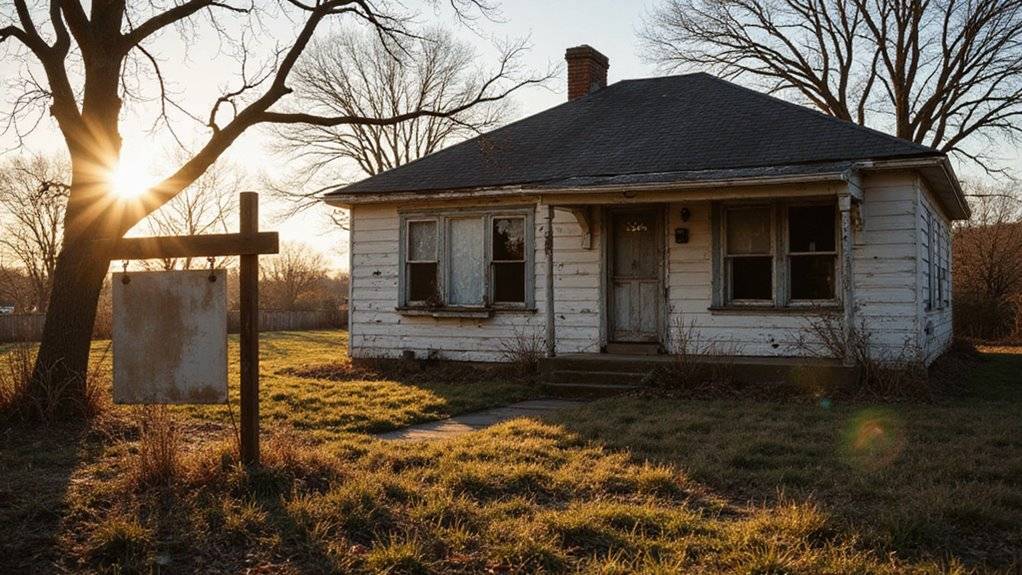Facing foreclosure can be a stressful ordeal. When you get a notice of default, time is not on your side. The window to sell your house is often only 30 to 120 days, based on state laws.
This tight timeline adds immense pressure. Missing the deadline could mean losing your home at auction. Plus, your credit score might take a severe hit. But there’s hope if you act quickly.
You typically have 30 to 120 days to sell a house in foreclosure. Strategic steps can help you navigate this challenge successfully. This blog will guide you through the process. We’ll help you beat the foreclosure clock.
Key Takeaways
- The pre-foreclosure period typically lasts 30 to 120 days, offering time to sell before auction.
- Notice of Default starts the process, with timelines varying by state laws.
- Selling during pre-foreclosure allows control over price and buyer selection.
- State laws and lender rules influence the overall foreclosure timeline.
- Acting early in pre-foreclosure maximizes chances of a successful sale.
What is Foreclosure?

Foreclosure is a legal process where a lender takes back a property if the homeowner misses mortgage payments. This can be a tough situation, but understanding it helps you cope. If you stay informed, you can make better decisions.
The stress of foreclosure might affect your thinking, so stay calm and focused. Don’t believe myths that promise easy solutions or say you have no choices. If false ideas mislead you, you could miss real options.
Learn the facts about foreclosure to protect your home and rights. Knowing your options can help you find solutions. If you act early, you may avoid losing your property. Acting quickly can also open doors to fair cash offers from buyers who specialize in helping during foreclosure.
How Does Foreclosure Work?
Foreclosure is a legal process where lenders reclaim a property if mortgage payments are missed. It follows clear steps that homeowners should understand. Knowing this can help you respond effectively.
The first step is a Notice of Default. This formal letter arrives after missed payments, marking the process start. If ignored, it signals serious trouble ahead.
Next comes the Auction or Sale stage. If the debt remains unpaid, your home could be sold publicly. This often happens after several warnings.
Then, there are Redemption Rights in some states_you might reclaim your property by paying the full debt. This chance may come before or after the sale.
Finally, watch for Deficiency Judgments. If the sale doesn’t cover the loan, lenders may chase the remaining amount. Staying aware helps you prepare for this risk. Selling your home as-is during foreclosure can provide a faster solution to avoid complete loss of equity.
Pre-Foreclosure vs. Foreclosure: What’s the Difference?

Pre-foreclosure and foreclosure are distinct stages in losing a home. Pre-foreclosure starts when you miss mortgage payments. If you act, you can still save your property.
Foreclosure happens when the lender legally takes your home. This occurs if you can’t fix the missed payments. It often means losing ownership completely.
Laws differ across countries and regions for both stages. These differences can change your available options. If unaware, you might miss critical chances to act.
The emotional toll varies in each stage too. Pre-foreclosure gives hope to find solutions. Foreclosure, though, often brings deep stress and loss.
Understanding these differences helps you make better choices. If informed, you might prevent a devastating outcome. Take steps early to protect your home. Selling during pre-foreclosure can be a viable option with fast cash offers to avoid losing everything.
The Foreclosure Timeline Explained
Handling foreclosure can be tough, but knowing the timeline helps you act wisely. This process changes based on local laws and global trends. If you learn the steps, you can meet key deadlines.
The first stage starts after missing payments for 90 days. Lenders then begin formal actions against you. If payments stay unpaid, they move forward legally.
You will get a Notice of Default as a warning. This marks the start of legal steps against you. If unresolved, the process continues quickly.
Your property may go to a public auction soon. If no one buys it, the lender might take ownership. Stay updated on laws to know your options.
Timeframe to Sell During Pre-Foreclosure

If you’re facing foreclosure, understanding the pre-foreclosure period—typically lasting 30 to 120 days depending on your state and lender—gives you a critical window to act. Selling during this phase offers both opportunities, like negotiating with buyers for a quicker sale, and challenges, such as limited time and potential equity loss. Acting early is essential, as it maximizes your control over the process and helps avoid the harsher consequences of full foreclosure. For those in St. Louis County, MO, we can provide a fair cash offer within 24 hours to help expedite the process.
Typical Duration of Pre-Foreclosure Period
The pre-foreclosure period is the time after missing mortgage payments but before formal foreclosure begins. It usually lasts between 30 to 120 days, depending on state laws and lender rules. If you act quickly, you can explore helpful options.
Several factors affect how long this period lasts. State laws might require longer notice before foreclosure starts. Lenders could also provide extra time or special plans if requested.
Loan types play a role in the timeline too. Government-backed loans often follow stricter schedules than others. If you know your loan type, you can plan better.
Historical trends show delays during tough economic times. Global differences also mean shorter periods in some countries. Stay updated on your situation to use this time wisely.
Selling During Pre-Foreclosure: Key Opportunities and Challenges
Selling during pre-foreclosure gives you a vital chance to act before the bank steps in. If you move quickly, you can control the sale and set a fair price. This helps attract buyers despite changing market conditions.
Challenges can arise when selling in this stage. Family disagreements or emotional stress might slow down your decisions. If tensions grow, staying calm and focused is key.
To succeed, seek advice from professionals for guidance. They can help you price the home wisely against market shifts. If you act decisively, a better outcome is possible.
Why Acting Early is Crucial
Timing is vital when selling a house in pre-foreclosure. If you act fast, you can avoid major financial loss. Early action helps reduce stress and protects your future.
Selling soon offers clear benefits. It keeps your home from a public auction. This way, you maintain control over the sale.
Acting early also boosts your home’s value. If you have more time, you can negotiate better prices. Waiting too long limits your options.
Quick decisions cut down on legal worries. They also lessen emotional strain. If you delay, stress can build up fast.
Finally, early action saves your credit score. Foreclosure can harm it badly. If you sell now, you protect your rating.
Selling the House After Foreclosure Begins

If foreclosure has already started, you might wonder if it’s too late to sell your house, but options still exist. Act quickly to work with your lender and investigate postponing the auction to buy yourself more time for a sale. Consider a short sale as a viable alternative to avoid the full impact of foreclosure on your credit. Additionally, selling to cash home buyers can provide a fast and hassle-free solution to stop the foreclosure process.
Is It Too Late to Sell?
You can still sell your house even if foreclosure has started. Acting fast is crucial to avoid bigger losses. If you delay, your chances of a good deal may shrink.
Timeline limits your selling window during foreclosure stages. If you wait too long, selling becomes much harder. Price your home competitively to draw buyers quickly.
Disclose all foreclosure notices to avoid legal trouble. Market conditions can worsen, risking your home’s value. If trends dip, you might face equity loss.
Move swiftly to protect your interests. Consult experts for guidance on the process. If you act decisively, you can still save value.
Working with the Lender to Postpone Auction
Start by contacting your lender to delay the foreclosure auction. Explain your plan to sell the house soon. If you’re honest, they might agree to help.
Lenders often want to avoid auction costs. Show them proof of your efforts, like a listing agreement. If you’re active, they could consider a delay. Ask for a specific delay, like 30 to 90 days. Base this on a realistic timeline for selling. If needed, follow up regularly.
Keep records of all talks with the lender. This ensures everything is clear and documented. If you stay persistent, you may gain extra time.
Short Sale as a Foreclosure Alternative
A short sale can help you avoid the harsh effects of foreclosure. It lets you sell your home for less than the mortgage owed, with lender approval. This option reduces severe credit damage if acted upon quickly.
If foreclosure has started, a short sale might be your best choice. It works even if you’re away, with the right help. This can speed up the process significantly.
For renters, a short sale minimizes property disruptions. It also offers better credit protection than foreclosure does. If approved, it may reduce or forgive leftover mortgage debt.
Acting fast is crucial to secure this option. Consult experts to guide you through the process. Negotiate with your lender before the auction happens.
Strategies to Sell a House in Foreclosure Fast

If you’re facing foreclosure, selling your house quickly requires smart tactics to minimize loss. Start by partnering with a real estate agent who specializes in foreclosures, consider offers from cash buyers or “We Buy Houses” companies, and focus on preparing your home to attract fast interest. These strategies can help you secure a sale before the foreclosure process finalizes. For a streamlined solution, explore local cash buyers like Freedom Path Investors who can provide fair cash offers within 24 hours.
Working with a Real Estate Agent Specializing in Foreclosures
Selling a house in foreclosure is tough, but a specialized agent can help. They know how to handle tight deadlines and tricky steps. If you choose them, you’ll feel more confident.
These agents bring many benefits to the table. Their market insight helps set the right price for quick sales. If issues arise, they can guide you through legal challenges.
Speed is another advantage with these experts. They ensure fast transactions to avoid delays. If time is short, their skills make a big difference.
Their marketing targets buyers looking for distressed properties. This focus can lead to quicker offers. If you need results, their strategy works well.
Don’t overlook their importance in tough times. They are your best support for a successful sale. If you’re struggling, their help is key.
Cash Buyers and “We Buy Houses” Companies
Cash buyers and “We Buy Houses” companies help solve foreclosure issues quickly. They buy homes fast, often in days. This means you get relief from foreclosure stress without waiting.
These buyers pay in cash, skipping bank delays. If you choose them, deals close without long talks. You can avoid extra hassle during tough times.
Before agreeing, research each company well. Look at reviews to check their trustworthiness. If reviews seem bad, consider other options.
Make sure they use fair and clear terms. Ask direct questions about their offer details. If something feels wrong, don’t sign anything.
Compare offers from different companies first. Contact a few to see who pays best. This helps you find a safe, quick sale.
With the right buyer, stress can ease fast. A good deal lets you move on. If chosen wisely, foreclosure won’t burden you.
Preparing the Home for a Quick Sale
Getting your home ready can speed up the sale process. Simple steps make your property attractive to buyers. If you act quickly, offers may come faster.
Focus on clearing clutter to create a welcoming space. Remove personal items so buyers can imagine living there. If spaces look empty, buyers feel more connected.
Small kitchen updates can make a big difference. Try painting cabinets or changing hardware for a fresh look. If budgets allow, these changes impress buyers.
Improve curb appeal with easy landscaping tasks. Trim bushes and add mulch to enhance the exterior. If the outside looks neat, buyers notice immediately.
Fix minor issues to avoid buyer doubts. Repair leaky taps or damaged tiles before showing the home. If problems persist, buyers might hesitate. Act now to see quicker results. These tips can help sell your home faster. If you prepare well, success is likely.
Legal and Financial Considerations
As you navigate selling a house in foreclosure, understand that your rights as a homeowner play a critical role in the process. You must also consider how state laws vary, directly affecting the timeline for completing the sale. Additionally, if you’ve filed for bankruptcy, know that it can significantly alter the duration and complexity of the transaction. For those in urgent situations, exploring options like fair cash offers can provide a quick and hassle-free solution to selling your property.
Rights of the Homeowner in Foreclosure
Facing foreclosure is tough, but homeowners have rights to protect them. These rights help you manage the process better. If you know them, you can possibly save your home.
One key right is Redemption Rights. This lets you reclaim your property by paying the full debt. If the sale happens, you might still have a chance to pay.
Another right is Legal Appeals. You can challenge the foreclosure if mistakes or violations occur. This ensures the process stays fair.
You also have the Right to Notice. Lenders must inform you properly about foreclosure proceedings. If they don’t, you can take action.
The Right to Cure is important too. You can often reinstate your loan by catching up on payments. If possible, act quickly to avoid losing your home.
Some areas offer the Right to Mediation. This means you can negotiate with lenders to find solutions. If available, use this to discuss options.
Lastly, you have the Right to Fair Process. Lenders must follow legal standards during foreclosure. If they fail, you can seek help.
Role of State Laws and Differences in Timelines
State laws play a big role in shaping the foreclosure process and timeline for selling a house. Each state has unique rules for notices, redemption periods, and sale methods. If you know these laws, you can better predict your timeline.
Some states require judicial foreclosures, which may take months or even years to complete. Others allow faster non-judicial processes, speeding up the timeline significantly. If your state uses non-judicial methods, you might have less time to act.
Certain states have introduced timeline reforms to either protect homeowners or help lenders recover faster. These changes can shorten or lengthen the foreclosure process based on local rules. Check your state’s regulations to understand their impact.
You must stay updated on your state’s specific foreclosure laws to avoid surprises. If you act quickly, you can improve your chances of selling before foreclosure finalizes. Local resources can provide the details you need.
How Bankruptcy Impacts the Sale Timeline
Filing for bankruptcy directly affects the timeline of selling a house in foreclosure. It triggers an automatic stay that stops foreclosure temporarily. This delay offers time to manage finances or talk with lenders.
The automatic stay can last for months, based on bankruptcy type. If you file under Chapter 7, liquidation might happen faster. However, Chapter 13 may slow things with a repayment plan.
Selling during bankruptcy often needs court approval, which adds extra time. Lenders might also ask to lift the stay, reducing your window. If this happens, the timeline could shrink significantly.
Act quickly to make the most of this temporary protection. If you delay, options might become limited. Use this period to plan your next steps wisely.
How to Avoid Foreclosure Altogether
If you’re facing the threat of foreclosure, take immediate action by exploring loan modification programs that can adjust your mortgage terms to make payments more manageable. Don’t hesitate to negotiate forbearance or repayment plans with your lender, as these options can provide temporary relief or a structured path to catch up on missed payments. Act quickly and seek professional help from a housing counselor or financial advisor to guide you through these critical steps and protect your home. Additionally, consider selling your house fast to a trusted buyer to avoid foreclosure and secure a fair cash offer quickly.
Loan Modification Programs
Facing foreclosure can be tough, but loan modification programs offer help. These programs change your mortgage terms for easier payments. If you act fast, you might save your home.
Eligibility depends on your financial struggle and ability to pay. Lenders will check if new terms suit you. Gather all your financial documents for the application.
Modified terms could mean lower interest rates for you. Your loan period might also get extended. Ensure these changes fit your long-term plans.
Don’t wait to contact your lender about this option. If you delay, foreclosure might proceed quickly. Reach out today to explore this solution.
Forbearance and Repayment Plans
Forbearance and repayment plans offer vital help to stop foreclosure if you’re struggling with mortgage payments. Forbearance lets you pause or lower payments temporarily, providing time to stabilize your finances. If you act quickly, lenders may offer this relief during tough times.
Repayment plans become useful once you’re ready to catch up. They allow you to spread missed payments over a set period, easing the burden. If you contact your lender soon, you can negotiate suitable terms.
Acting fast is key to using these options effectively. Delaying might risk losing your home to foreclosure. If you’re proactive, you can regain control of your finances confidently.
Seeking Professional Help Early On
Facing foreclosure risks is tough, but early help can save your home. Experts guide you through this financial mess. Acting now prevents bigger problems down the line.
If you reach out soon, professionals can offer useful strategies. Financial advisors will review your budget and talk to lenders. They might find ways to ease your payments.
Housing counselors provide free tips to avoid losing your home. They know the best steps to take if you’re struggling. Their advice could make a big difference.
Legal experts can also protect your rights during this crisis. If issues arise, they’ll explore your options carefully. This support ensures you’re not alone.
Support groups connect you with others facing similar challenges. Sharing experiences can bring emotional relief and ideas. If you join, you might feel stronger.
Don’t wait until it’s too late to act. Personal coaching helps build a plan to stay stable. If you start now, saving your home is possible.
Conclusion
In summary, selling a house in foreclosure requires quick action within a tight 30 to 120-day pre-foreclosure window. If you delay, you risk losing the property at auction and damaging your credit. Acting promptly can help secure a better outcome.
If you’re struggling, consider that we buy houses for cash, offering a fast solution. This option could help you avoid foreclosure complications. With a cash offer, you might close the deal swiftly.
Should you need assistance, we at Freedom Path Investors are ready to help. Contact us today for personalized guidance. Take control now and secure your future with our support.







